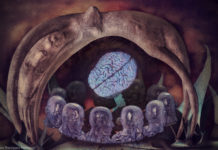REFOCUS Psychosis Recovery Intervention Ready for Trials
A new pro-recovery manualized intervention – called the REFOCUS intervention – has been developed and will now be evaluated in a multisite randomized control trials. The strengths-based intervention, which focuses on promoting relationships, is outlined in the latest issue of the British Journal of Psychiatry.
“When the Brain is Under Attack”
The Boston Globe reports on the discovery of a newly recognized neurological disease, anti-NMDA receptor encephalitis. The disease is believed to be caused when the body’s immune system attacks proteins in the brain associated with the communication of neurons.
New Research on Patient-Centered Deprescribing for Antipsychotics
Researchers review the risks and benefits of deprescribing from antipsychotic drugs and advocate for a patient-centered approach to tapering.
How Much can a Psychiatrist Charge to Visit With a Dead Research Subject?
At the University of Minnesota, the answer is apparently $1,446. If harmless clerical errors were to blame for oddities like this, that fact should be easy to clarify simply by looking at the relevant documents. But if there are systematic issues with the administration of clinical trials that makes it possible to bill for a visit with a dead subject, those issues would be important for other universities and private trial sites as well.
“Auditory Hallucinations: Debunking the Myth of Language Supremacy”
In Schizophrenia Bulletin, an Australian and a French researcher argue that the Hearing Voices Movement and similar groups are often misleading the public and...
My Mysterious Son
In the autumn of 1996, my son was seventeen when he told me one day on the way home from school: “I don’t know what’s happening, I can’t find my old self again.” He’d had a seemingly marvelous summer staying with family in Mexico, fishing and learning to surf. He’d achieved nearly a full scholarship for his junior year at a Boston private school. However, one teacher had observed that, in class, he “sometimes seems to be out of touch and unable to focus his mind.”
The Real Myth of the Schizophrenogenic Mother
Acknowledging the role of trauma inflicted by a given individual’s mother is not the same as laying all blame for “mental illness” at the feet of motherhood. Meanwhile, a mountain of evidence has accumulated linking schizophrenia to sexual, physical, and emotional abuse and many other categories of adverse childhood experiences.
Why Paul Steinberg Has It All Wrong (and Should Stop Seeing Patients)
(This commentary originally ran on Beyond Meds)
In his New York Times op-ed entitled “Our Failed Approach to Schizophrenia“ Paul Steinberg, a psychiatrist in private practice, proposes we...
Hearing Voices Network Responds to Susan Inman HuffPo Piece
On Saturday morning, Susan Inman, writing for HuffPost Canada, published “What You’re not Hearing About the Hearing Voices Movement.” In it, she criticizes HVM for “failing to differentiate between the needs of people who actually have psychotic disorders and those who don't.” On Sunday the Bay Area Hearing Voices Network published an open letter in response, writing: “Ms. Inman has profoundly mischaracterized hearing voices networks (HVNs) and also demonstrates a troubling lack of understanding of the empirical literature on psychosis, optimal psychosocial intervention and recovery.”
Questions About Childhood Trauma And Schizophrenia Settled
In the first analysis of 30 years of studies, including 46 studies (selected from 27,000) involving 80,000 subjects, researchers in the U.K. and Australia...
MRI Studies
During the 1990s, researchers using MRI technology discovered that antipsychotics shrink the frontal lobes and cause an enlargement of the basal ganglia. In the...
Madness and the Family, Part III: Practical Methods for Transforming Troubled Family Systems
We are profoundly social beings living not as isolated individuals but as integral members of interdependent social systems—our nuclear family system, and the broader social systems of extended family, peers, our community and the broader society. Therefore, psychosis and other forms of human distress often deemed “mental illness” are best seen not so much as something intrinsically “wrong” or “diseased” within the particular individual who is most exhibiting that distress, but rather as systemic problems that are merely being channeled through this individual.
A Daughter’s Call for Safety and Sanity in Mental Health
My mother was once a bright, creative, beautiful young woman, a promising artist and a poet, who was captivated by the hippie movement. She was a creative bohemian artist, defying the conventions of our middle-class Jewish Midwestern family, which had carried a tradition of holding emotions inside and acting stoic. One day, soon after my grandparents’ divorce, she left. She hitched a ride to California, and from that point on, was never the same. The police picked her up on a park bench in Arizona, and she was committed for the first time at age 18. She rotated in and out of mental hospitals, the streets, and jail until her death.
Meta-analysis Links Childhood Trauma to Psychosis Symptoms
The study results suggest that experiences of childhood trauma impact the development of symptoms associated with psychosis.
“Can Madness Save the World?”
Writing for CounterPunch, Paris Williams writes that when an individual is experiencing what has been termed “psychosis,” it is important to recognize that this may also be the manifestation of a breakdown in their larger social groups, the family, society, and even the species.
“Schizophrenia Breakthrough” – Or a Case of Ignoring the Most Important Evidence?
Last week, the headlines blared: "Schizophrenia breakthrough as genetic study reveals link to brain changes!" We heard that our best hope for treating “schizophrenia” is to understand it at a genetic level, and that this new breakthrough would get us really started on that mission, as it showed how a genetic variation could lead to the more intense pruning of brain connections, which is often seen in those diagnosed with schizophrenia. “For the first time, the origin of schizophrenia is no longer a complete black box,” said one (while admitting that "it's still early days"). The acting director of the National Institute of Mental Health (NIMH) described the study as “a crucial turning point in the fight against mental illness.” But is all this hype justified?
Review Questions Long Term Use of Antipsychotics
Patients who recover from a single episode of psychosis are often prescribed antipsychotics long-term, despite a lack of evidence for this practice
Study Explores Māori Community’s Multifaceted Understanding of “Psychosis”
A new study explores how “psychosis” and “schizophrenia” are viewed within the Māori community in New Zealand.
“Programs Expand Schizophrenic Patients’ Role in Their Own Care”
Benedict Carey at the New York Times covers the push for new programs that emphasize supportive services, therapy, school and work assistance, and family education, rather than simply drug treatment.
The Legal and Moral Issues of Drugging Children
Jim Gottstein’s presentation March 29, 2012 at the APA’s Humanistic Division. Mr. Gottstein talks about the the legal and moral issues of the massive number...
Recovery Is Resiliency
Recovery is not a bridge we cross and never return to. Rather, it is more like crossing a stream we ford by side-stepping on different stones. Not all of the stones are as sturdy as some of the others. Yes, we slip at times, only to regain our footing and forge ahead.
Researchers Explore Sexuality and Gender in the Context of Psychosis
Nev Jones and a team of researchers examine how sex, sexuality, and gender-related content are underexplored in contemporary research on psychosis.
Psychiatrists’ Prescriptions for First-time Psychosis Often Don’t Follow Guidelines
"Many patients with first-episode psychosis receive medications that do not comply with recommended guidelines for first-episode treatment," states a National Institute of Mental Health...
What Happened After a Nation Methodically Murdered Its Schizophrenics? Rethinking Mental Illness and Its...
When we begin to question, we discover that (1) scientifically flawed research has been used to promote ideas around mental illness and its heritability, and (2) instead of focusing on nature vs. nurture causes of mental illness, it’s time to consider whether certain phenomena are really symptoms of pathology or instead are inextricable aspects of our humanity.
















